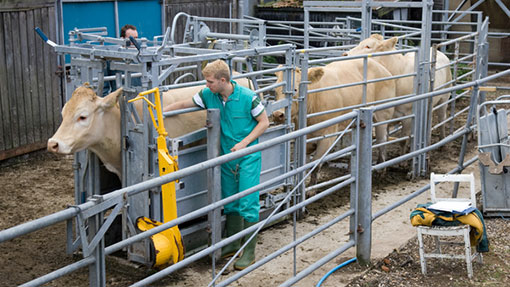Cattle TB vaccine field trials delayed until 2015

Field trials of a TB vaccine for cattle have been delayed until 2015, the government has confirmed.
Extensive field trials were due to begin in the UK this year, but they have been pushed back amid continued discussions over the cost of the project.
The field trial costs are estimated at “tens of millions of pounds”, a spokesman for the Animal Health and Veterinary Laboratories Agency said.
However, despite the delay, the AHVLA said the government was still “100% committed” to staging field trials in this country.
Defra has commissioned a consortium, including Triveritas UK, scientists from the AHVLA and Cambridge University, to design field trials of a vaccine to protect cattle against TB.
Read more on Bovine TB
Triveritas, which specialises in clinical trials in livestock, will design the field trials as well as a trial for a new cattle TB diagnostic test – known as a DIVA test – which is needed to distinguish between infected cows and cows that have been immunised.
The trial design work, which is expected to be completed this autumn, will be subject to the granting of an Animal Test Certificate (ATC) by the Veterinary Medicines Directorate (VMD).
The certificate is required to permit field trials of an otherwise unauthorised vaccine in the UK.
An AHVLA spokesman insisted that the trials would start in 2015 but “were likely to depend upon a positive cost analysis of the use of a cattle vaccine and DIVA test contributing to the control of bovine TB in the UK”.
Defra has said developing a TB vaccine for cattle and badgers remains a “high priority” in its 25-year bovine TB eradication programme.
However, government scientists have warned that a cattle TB vaccine would be “no silver bullet” and other measures, including culling badgers, were necessary to eradicate TB.
Small-scale field trials in Ethiopia and Mexico have suggested that the protective effect of vaccination was between 58% and 68%. But confirmation of effectiveness in UK conditions will need to be confirmed by large-scale field trials in England and Wales.
Vaccination of cattle against TB is currently prohibited by EU legislation, principally because BCG (Bacille Calmette Guerin) vaccination can interfere with the tuberculin skin test, the most commonly used diagnostic test for TB in cattle.
Last year, the European Commission announced that the provisional timetable for changing legislation and approving a cattle vaccine was the year 2023.
Meanwhile, a recent review of research into TB vaccination in cattle and badgers warned that developing vaccines for tackling the problem was “challenging, time-consuming and resource-intensive”.
The review, published in the Veterinary Record, said Defra and the Welsh government were working with the European Commission to enable vaccination of cattle to be conducted in UK field trials, in order to “change the legislation on the use of cattle TB vaccines in the medium to long term”.
It added: “The field trials of cattle vaccine offer significant benefits through better understanding of vaccine efficacy and DIVA test characteristics, but also face substantial challenges relating to legal and practical delivery.
“Given the likely large scale of the vaccine field trial, they will need to be supported by a strong cost-benefit case. The ultimate endpoint of using BCG in cattle without trade restrictions may not be achieved until 2023.”
In this parliament (2010-15), the coalition government is spending £24.6m on the development of cattle and badger TB vaccines.
Over the next decade, according to Defra the cost of TB in cattle is projected to rise to £1bn.
